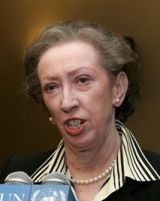US, Britain to keep up pressure on Sudan
April 17, 2007 (UNITED NATIONS) — Despite a Sudanese promise yesterday to cooperate with one phase of a U.N. plan for Darfur, British and American officials are refusing to scale back their pressure on the government in Khartoum, the New York Sun said.

But after a Security Council meeting here, Foreign Secretary Margaret Beckett of Britain said yesterday’s “little progress” on Darfur was the result of “diplomatic encouragement, but also the threat of sanctions.” She added that now “everyone is weighing up” whether that threat should be removed.
Western diplomats and U.N. officials said Sudan has made similar promises in the past and later broken them. The test for the country now will be “the whole implementation” of the U.N. plan, Undersecretary-General for Peacekeeping Jean-Marie Guéhenno told The New York Sun, adding that he still has concerns about “bureaucratic spokes they can put in it,” despite yesterday’s letter.
Mr. Abdalhaleem told reporters that the implementation of the agreement depends on U.N. funding for this phase of the plan, and on “enhancing the peace process” among his government, the militias it backs — known as the janjaweed — and the Darfur rebel groups.
The Sudanese ambassador stopped short of saying his government would accept the next phase of the plan, in which at least 20,000 African troops, backed by European and Western commanders and logistical support staff, would be deployed in an attempt to end the violence in Darfur, which America has called a “genocide.”
Deputy Secretary of State John Negroponte was in Sudan yesterday, and several diplomats said easing the threat of U.N. Security Council sanctions and other decisions would depend largely on his assessment of Sudan’s readiness to cooperate with the U.N. plan.
In London, Secretary of International Cooperation Hilary Benn said Britain and its allies are still preparing for an “extended arms embargo” against Sudan and “sanctions on individuals.”
Khartoum has yet to accept the full deployment of a “hybrid force” of African and U.N. troops, agreeing only to a “transitional” phase, an American ambassador to the United Nations, Alejandro Wolff, said. “We have seen a letter from the Sudanese ambassador,” he said, but “learned a long time ago not to take these letters at face value.”
The first reports of a possible Sudanese policy reversal appeared yesterday by the Saudi Press Agency, which reported that President al-Bashir of Sudan had informed King Abdullah of Saudi Arabia that he had signed an agreement “determining the duties of the African Union and United Nations forces in Darfur.”
At a recent Arab League summit, Mr. Ban attempted to enlist the king and other Arab leaders, who in the past have declined to put pressure on Sudan, to convince Khartoum to accept the U.N. plan. Yesterday, Mr. Ban thanked the king.
TIMING PROBLEM
“I think there will be a real problem of timing … It depends on who now comes forward as troop contributing countries,” British Ambassador and current Security Council president Emyr Jones Parry told reporters.
“That’ll take a while to establish and then how soon can they get there? … The hope is that the (peacekeepers) there will remain, but that others will come on board.”
Also unresolved is the question of funding. Cash will have to come from voluntary donations until the U.N. force arrives, at which time all U.N. members will be assessed for the financing. But first Sudan needs to allot land for camps and provide water needs.
U.S. Ambassador Alejandro Wolff added a further note of caution, saying that while Sudan’s letter accepting the interim package was unambiguous, “that has been the case with previous letters”.
“We find that the ambiguities and the clarifications are required after you take them up on their letters that said they agreed to this,” he told reporters.
Ban said the United Nations and the African Union were also pushing for a political settlement in Darfur and had instructed their special envoys, Jan Eliasson and Salim Ahmed Salim, to produce a “more detailed and workable road map for a political process.”
The report of new bloodshed in northern Darfur was made by Ibrahim al-Helu, a commander in one rebel faction of the Sudan Liberation Army, who said government troops and militia had attacked 11 villages, killing more than 70 people.
A spokesman for the Sudanese army said it had no operations in that area, and these were “normal clashes between tribes”.
Britain’s Blair said if Sudan did not agree to the U.N. package, “a strong resolution with sanctions” would be needed.
The apparent deal on the interim package, however, has temporarily defused talk of sanctions and in New York, both Jones Parry and Wolff dodged questions on the issue.
(NY Sun/Reuters)
